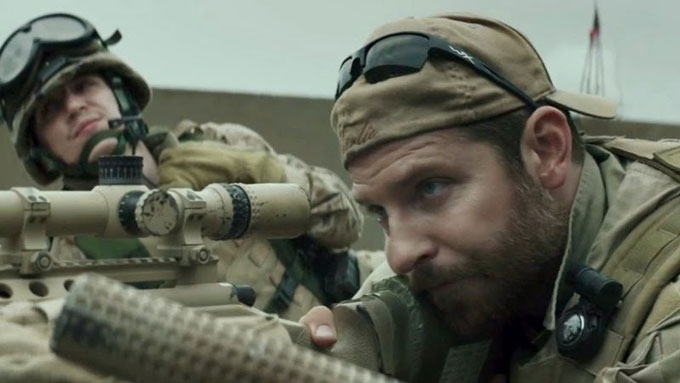American Sniper
by Jordan Canahai

As of this writing, director Clint Eastwood’s war drama American Sniper is sitting atop the domestic box office following a record-shattering first weekend. It’s also a film that has courted passionate admirers and detractors, while igniting sharp debate and controversy amongst both the film and political spectrum. To be honest, I find the reaction to be a little surprising. I would hope that movies which create a dialogue of such fervor would be far less pedestrian, conventional, and paint by numbers in their execution, as well as daring in content and insight, than Eastwood’s latest.
Based on the autobiography of Navy SEAL Chris Kyle (Bradley Cooper), the man who has more confirmed kills than any sniper in US history, American Sniper details his life story and combat experiences. The film charts Kyle’s progression from an idealistic young Navy recruit, eager to defend his country, to a man hardened in the crucible of battle after being deployed to Iraq, and later haunted by the horrors of war and the personal toll it takes on his wife (Sienna Miller) and children. The film’s best scenes involve the intense personal bonds Kyle forms with fellow soldiers, as well as how he copes with the atrocities of war he both witnesses and takes part in. One of the film’s most harrowing scenes is an early one, in which Kyle’s first taste of battle involves him killing a woman and her child following their assault with a grenade. Despite how Eastwood effectively captures moments of such emotional intensity, the human story of American Sniper proves very problematic.
The film’s major flaws can most certainly be traced back to writer James Hall’s routine, formulaic screenplay. It has been suggested by many from personal accounts of those close to him, as well as his own autobiography, that the real Chris Kyle was a far more tortured, complicated, and conflicted man than the film seems to suggest. While it’s easy to see why Eastwood and Hall chose to shy away from the darker aspects of Kyle’s personality and the demons that he wrestled with, the movie suffers deeply as a result. Despite Cooper’s admirable performance and formidable screen presence, the Chris Kyle of American Sniper comes off as a pretty typical Hollywood protagonist; while a more true-life depiction of the man would likely reveal much more about the uncomfortable truths of the war on terror, as well as war in general. It also doesn’t help that the film’s handling of Kyle’s domestic life, in particular his struggles to cope with PTSD and the strain his marriage endured, comes off overly familiar and hollow in ways Eastwood’s direction can’t elevate. Hell, in many ways Ava Duvernay’s historical drama Selma, with its assured formalism, wonderful performances, clear-eyed screenplay, and deep humanist empathy, contains all the hallmarks of and is a much better Eastwood movie than American Sniper.
The box office success of the movie certainly seems to suggest that audiences are ready for serious-minded films that address the war on terror and our nation’s conflicts in Iraq and Afghanistan. Unfortunately, despite some strong moments and a handful of earnest performances, one can’t help but feel let down by American Sniper. Even more so when one compares it to the major war films from a generation ago, made in the decade following our country’s involvement in Vietnam, The Deer Hunter and Apocalypse Now. For whatever flaws one might find in them, both films (particularly Apocalypse Now) were far more staggering in scope, ambition, and depth of feeling (not to mention subversive in their insights) than anything American Sniper even attempts. Among Eastwood’s outstanding, though often inconsistent body of work, it ranks as a lesser effort. Much more impressive are his great World War II films, Flags of Our Fathers and Letters from Iwo Jima, released as companion pieces back in 2006. I suspect that after the hype has subsided and with the passage of time they will resonate far more poignantly as examinations of war in all its grim realities and contradictions than American Sniper.
Watch the trailer for American Sniper
|
Issue Navigation> Issue Index > v14n3 (Week of Thursday, January 22) > Film Reviews > American Sniper This Week's Issue • Artvoice Daily • Artvoice TV • Events Calendar • Classifieds |









 Current Issue
Current Issue